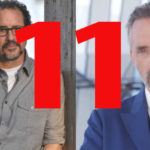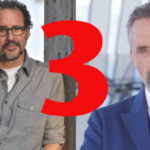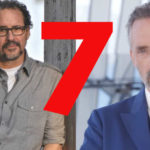We run our website the way we wished the whole internet worked: we provide high quality original content with no ads. We are funded solely by your direct support. Please consider supporting this project.
Myth of a Christian Religion Endorsements and Reviews
Reviews:
Imitating the life of Jesus isn’t solely about embracing his message of love, sacrifice and service, according to evangelical pastor Boyd. In his latest book, the author of The Myth of a Christian Nation also asserts that becoming part of the “beautiful revolution” means rebelling against everything that is incompatible with that way of life, including violence, poverty, sexual promiscuity and secularism. While exhortations to practice the presence of God and generous to the poor are likely to be uncontroversial, the writer seems to enjoy afflicting the comfortable, whether they are church-going believers or secular atheists. His critique of the “pagan values of our nation” and his impassioned call to choose love over judgment may occasion heated conversation among more conservative readers, while his endearing honesty and accessible style will undoubtedly appeal to others. Boyd has included an extensive action guide, whicj includes multiple exercises for self-reflection, as well as his practical suggestions for churches and small groups on how, as he sees it, to lose one’s religion and become a part of the radical kingdom of Jesus.
–Publishers Weekly
Greg Boyd’s latest book, “The Myth of a Christian Religion” (subtitled “Losing Your Religion for the Beauty of a Revolution”), is a bona fide paradigm shifter. Boyd is an Evangelical, to be sure, but definitely not the run-of-the-mill, cookie-cutter kind, as he demonstrated in earlier works: “The Myth of a Christian Nation,” “God of the Possible,” and “Is God to Blame?” Dr. Boyd is, in fact, an Evangelical theologian, pastor, and award-winning author whose book, “The Jesus Legend,” co-written with Paul Eddy, won the 2008 Christianity Today Book of the Year Award in the Biblical Studies category.
So, what is this “revolution” Boyd is talking about? Up front, he confesses to being a skeptic, not of faith or scripture, but he is skeptical of the worth of modern American Christianity. As a graduate student he grew increasingly aware of “how central following the example of Jesus is to the understanding of what it means to ‘be saved.’” He writes, “This slowly opened my eyes to the radical contradiction between the lifestyle Jesus calls his followers to embrace, on the one hand, and the typical American lifestyle on the other. It struck me that the Church in America largely shares—even celebrates—the typical American lifestyle.” His conclusions are validated by research showing that the values of American Evangelical churchgoers are largely indistinguishable from those of non-churchgoing Americans. This disturbed Boyd and led him to wonder how such a thing could possibly be. His conclusions are the crux of “The Myth of a Christian Religion” in which he contends that American Christians need a backward “revolution” away from the pervading popular culture and back to the lifestyle Jesus taught and demonstrated in the Gospels, a view summed up in a single biblical passage that states, “Whoever claims to live in him must live as Jesus did.” That’s a tall order. But it is the patent teaching of scripture.
Boyd’s contention is that centuries of dogma and religion have made modern Christianity very dissimilar to and incompatible with what Jesus lived and taught. He tackles this thesis on several fronts, devoting a chapter to each, saying that to be true followers of the Jesus of the Gospels we need a ruthless revolution (some might call it a revival) against the modern idolatries of secularism, nationalism, religion, judgmentalism, individualism, violence, social oppression, racism, greed, ecological abuse, and sexual exploitation. Perhaps the most striking chapters for me were the ones attacking Christian “Nationalism” and “Violence,” chapters which include a reproduction of Lars Justinen’s controversial painting depicting Jesus washing the feet of Osama Bin Laden.
Boyd himself is somewhat of a controversial figure among Evangelicals. While he deplores activists who masquerade right-wing politics behind a flimsy cloak of Christianity and is a leading voice of open theism (the view that the future is open and therefore known to God more as a realm of possibilities than certainties), he is also a vocal critic of the radical scholarship of the “Jesus Seminar” and of liberal New Testament scholars like John Dominic Crossan and Burton Mack. Obvciously, Greg Boyd is a person unafraid to hold and advance unconvential viewpoints, but by standing between these opposing camps he is sure to draw fire from both sides.
-Jim Miller, Book Review for Busy Pastors
Endorsements:
The Myth of a Christian Religion is one of the most sensible, fog-clearing books that I’ve read on the subject God’s Kingdom to date. I highly recommend it to all Christians, especially those who wish to cut through the religious clutter that surrounds American politics today.
– Frank Viola, author of From Eternity to Here, Reimagining Church, and Pagan Christianity
Greg Boyd is doing the prophetic work of exposing the false gods and idols of our age, debunking the militant “christianity” of crusades and “holy” wars, the triumphalist evangelicalism of moral gate-keeping and mean finger-pointing, the prosperity “gospel” of the American dream and manifest destiny… so that we can rediscover the true Gospel of our Lover Jesus that casts the mighty from their thrones and lifts up the lowly.
– Shane Claiborne, www.thesimpleway.org
Related Reading

Part 11 (of 15): The Corruption of Creation
Assessing Jordan Peterson’s 12 Rules for Life by Greg Boyd “With their capacity for aggression strait-jacketed within a too-narrow morality, those who are only or merely compassionate and self-sacrificing…cannot call forth the genuinely righteous and appropriately self-protective anger necessary to defend themselves.” Jordan Peterson In the previous three posts (post 8, post 9, post 10)…

Repenting of Religion Endorsements
Endorsements: “Anything but another run-of-the-mill evangelical book, it is radical and revolutionary. It will make readers think critically about some traditional evangelical habits of the heart.” –Roger Olson, George W. Truett Theological Seminary “The local church is called to be God’s community of redemption rather than the exclusive clique of rejection it has often become.…

Podcast: The Righteous Mind: Why Good People Are Divided by Politics and Religion
Greg talks about a book he enjoyed: The Righteous Mind: Why Good People Are Divided by Politics and Religion. http://traffic.libsyn.com/askgregboyd/Episode_0467.mp3

Part 3 (of 15): The Leap of Faith
Assessing Jordan Peterson’s “12 Rules for Life” by Greg Boyd I’ll begin by saying I’ve received several video clips of Jordan saying some rather outrageous and offensive things. I was, frankly, quite surprised, since I found 12 Rules of Life to be, on the whole, a seemingly thoughtful and fairly objective book. Yes, he gets…

Seeing is Believing Endorsements and Reviews
Endorsements “The imagination is one of the great, untapped capacities of the Christian soul, and imaginative prayer is like diving into the ocean and discovering a world of wonders never before glimpsed or even guessed at. Read Seeing is Believing and discover the great gift from God that you may have been missing.” –Luci Shaw,…

Part 7 (of 15): Hierarchies, Masculinity, and Femininity
Assessing Jordan Peterson’s 12 Rules for Life by Greg Boyd “Do male crustaceans oppress female crustaceans? Should their hierarchies be upended?” In the previous two posts we reviewed Peterson’s conception of life as a delicate balancing act between order and chaos (post 5) and we’ve explored how he applies this conception to biological and cultural…
